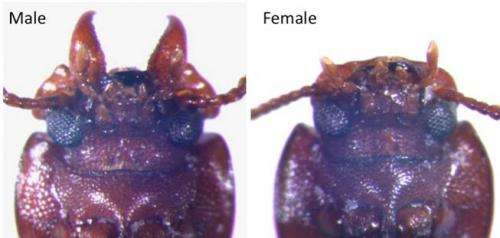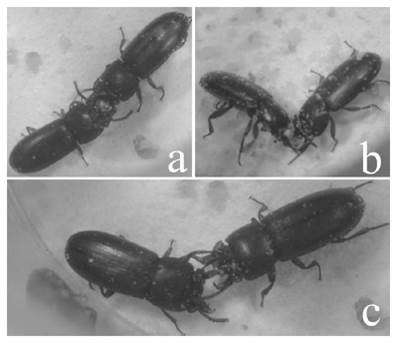Females prefer lovers not fighters, horned beetle study finds

It's official (in the horned beetle world at least), females prefer courtship over competitiveness – and it doesn't matter about the size of your mandibles either.
An international study by scientists at the University of Exeter and the Universities of Okayama and Tsukuba in Japan investigated the complicated sexual conflict over mating in Gnatocerus cornutus, the horned flour-beetle.
Female mate choice and male-male competition are the typical mechanisms of sexual selection. However, these two mechanisms do not always favour the same males.
Male horned beetles have enlarged lower jaws – or mandibles – used to fight rivals, and those with larger mandibles do have a mating advantage when there is direct male-male competition. But until now, it has not been clear whether the females actually prefer these highly competitive males.
After conducting experiments with hundreds of the insects, the researchers show that female choice targets male courtship rather than mandible size, and that the two traits are not physically or genetically correlated.
Professor Dave Hosken, of the Centre for Ecology and Conservation at the University of Exeter's Penryn Campus, said: "A major finding of this study was that the most attractive males, those most preferred by females, were not the highly competitive males with large mandibles. This is despite the fact these fighter males enjoy significant mating advantages when in direct competition for females. Instead, females prefer to mate with males that court more. This shows that choice and competition favour different traits."

The scientists also investigated whether females benefit from their choice of mate, both in terms of the effects on their own fitness and on the fitness of their sons and daughters.
Mating with more attractive and competitive males was not found to provide direct benefits to females, but it did lead to them producing more attractive and competitive sons.
For daughters, those whose mothers mated with attractive males (lovers) rather than competitive males (fighters) did not suffer from the masculization costs sometimes observed. These occur because when the body shape changes associated with developing large mandibles in males are transmitted to daughters it means a reduction in egg space.
More information: The article, 'Sexual conflict over mating in Gnatocerus cornutus? Females prefer lovers not fighters' by Kensuke Okada, Masako Katsuki, Manmohan D. Sharma, Clarissa M. House and David J. Hosken is published today (April 30) in the journal Proceedings of the Royal Society B: rspb.royalsocietypublishing.or … .1098/rspb.2014.0281
Journal information: Proceedings of the Royal Society B
Provided by University of Exeter



















